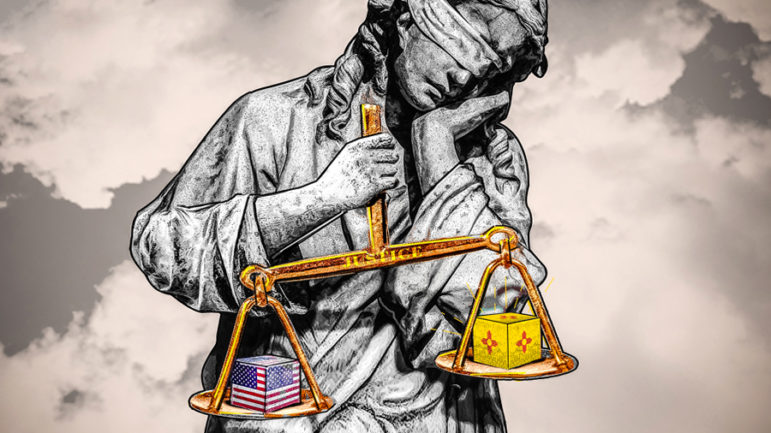
Lawmakers with an eye toward righting longstanding wrongs in the state’s criminal justice system— real or perceived — achieved success this session, pushing through reforms doomed under former Republican Gov. Susana Martinez’s vigilant eye as a former prosecutor.
Democrats’ bolstered majority in the House, the margin they maintained in the Senate and Democratic Gov. Michelle Lujan Grisham’s win in November set a different tone coming into the session. And the largest budget surplus in recent memory meant justice system reforms that carried a price tag were suddenly possible.
Legislation aimed at reducing New Mexico’s chronically high crime rates cleared the Senate and House, too. But this year’s bills had a different feel from those avidly debated in the recent past. They focused on what legislators call an “evidence-based” approach they hope will separate truly dangerous people from those who suffering with mental illness and substance abuse problems and in need of help. By contrast, previous sessions saw rafts of bills to increase penalties for a host of crimes.
While many of the higher profile criminal justice bills passed with bipartisan support, Lujan Grisham hadn’t signed any of them by the time the session adjourned. It isn’t clear which ones will ultimately become law.
Budget increases for prosecutors, public defenders and the court system passed easily this year, though longtime justice system watchers say there’s ground still to be made up. For example, New Mexico’s judges are the lowest paid in the nation. Those increases are coming, with the governor’s signature on the $7 billion budget approved by lawmakers.
A bill that requires detailed data collection and tracking on people who enter the criminal justice system passed both chambers without a single “no” vote. HB 267 mandates the assignment of a “unique identifier” to people at the point of arrest that would follow them through the court system and all the way to release from jail or prison, and that various entities within the system communicate with one another by sharing information. The measure does not require tracking of race or ethnicity, however.
Another criminal justice “omnibus” proposal, HB 342, also passed easily and awaits Lujan Grisham’s signature or veto. It means to improve the way the justice system serves people living with mental illness and substance abuse problems, requires training for law enforcement in the area of eyewitness identification in crimes and mandates notification of court hearings to crime victims and their families, among other changes.
If Lujan Grisham chooses to sign HB 364, New Mexico’s long, troubled history with the use of solitary confinement is bound for a rollback and more transparency. The bill’s reforms have long been a priority for civil rights advocates, who passed a nearly identical measure through the Legislature in 2017 only to see Martinez veto it.
SB 96, which passed both chambers with relative ease, would make New Mexico the 12th state to restrict private sector employers from inquiring about job applicants’ criminal history at the first stage of an interview process. Lawmakers also passed a bill with relatively wide margins that would allow people have certain crimes wiped from their records after the passage of time. That’s a reform Democrats have been pushing for years, and it did not come without controversy in 2019. Transparency advocates opposed it, saying it would restrict the public’s right to know.
Another proposal that passed with heated debate was HB 564, which would reform the state’s probation and parole systems by decreasing the types of offenses that constitute a violation and return people to prison or jail, among other changes. The shift that drew the most consternation was one that would require the Parole Board to issue detailed, written findings about their decisions to grant or deny parole to people who have served three decades of a 30-years-to-life sentence.
A few criminal justice reforms were left on committee room or chamber floors. One would have decriminalized small amounts of all drugs. Another would have legalized the recreational use of cannabis — and required the state to reconsider the sentences of people locked up for possessing the drug. But reformers were pleased with the passage of HB 323, which would decriminalize less than half an ounce of marijuana if Lujan Grisham signs it.